THE WONDERFUL STORY OF HENRY SUGAR (2023) and Three More
Four short films adapting the short stories of Roald Dahl...
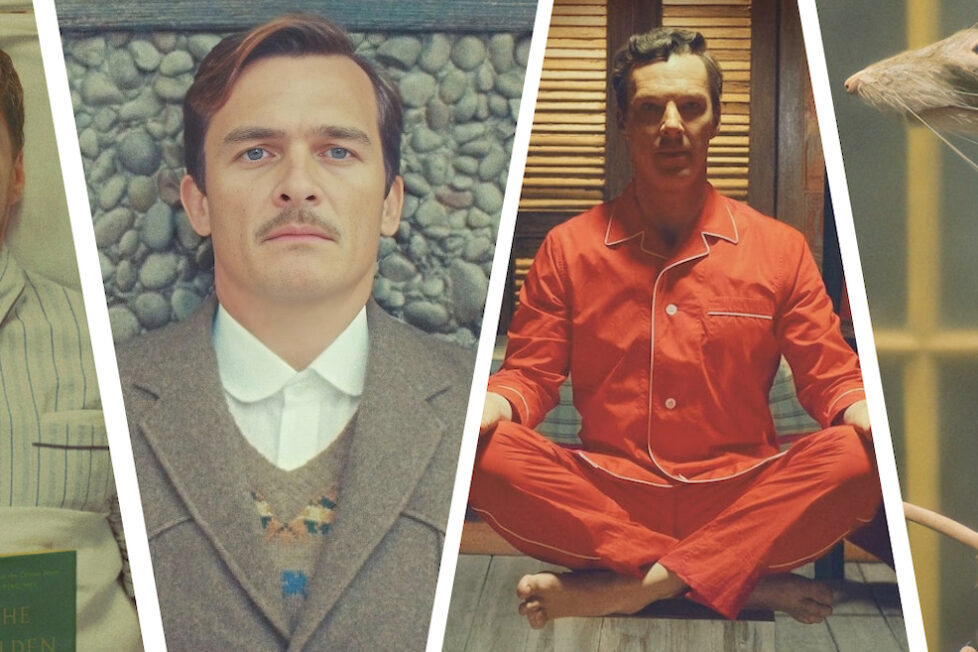
Four short films adapting the short stories of Roald Dahl...


The meticulously crafted worlds of Wes Anderson are delightfully whimsical and globally renowned for their distinctiveness—making them the perfect setting for Roald Dahl’s subversive humour, evocative imagery, and eccentric characters. In his stop-motion animation Fantastic Mr. Fox (2009), Anderson brought audiences and fans of the author to a rapturous childlike state, but his relationship with the Dahl estate didn’t end with that beloved portrayal of the Fox family.
After securing rights to 1977’s The Wonderful Story of Henry Sugar and Six More from Dahl’s daughter and grandson, Anderson teamed up with Netflix to release four short film adaptations. And these stories are the ultimate marriage of Wes Anderson’s distinct aesthetic and Dahl’s garrulous storytelling.
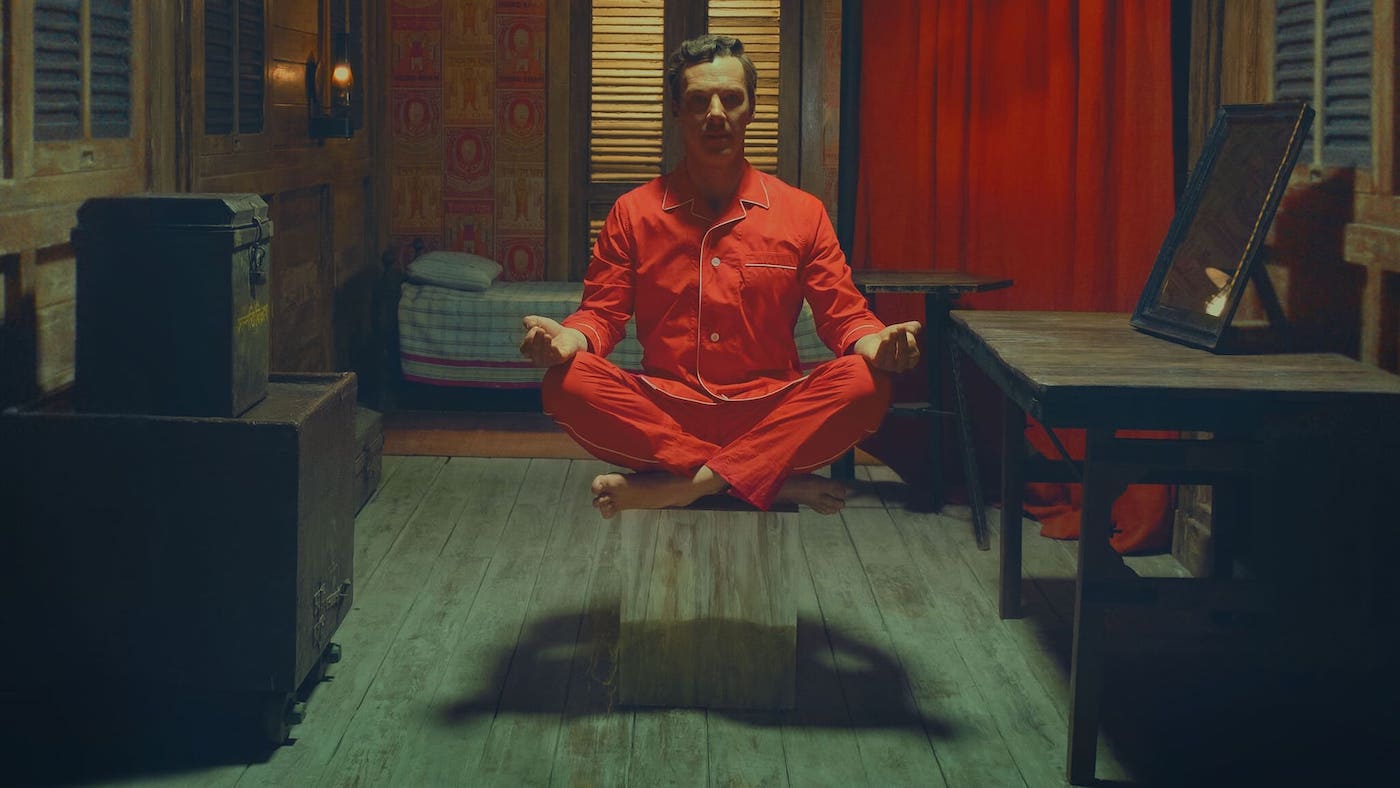

In the first and longest of the intertwined shorts, we meet Henry Sugar (Benedict Cumberbatch), an idle millionaire who’s dedicated himself to noble altruism. After perusing a mansions bookshelf one afternoon, he discovers a medical journal detailing the secrets of Imdad Khan (Ben Kingsley)—an Indian guru who, after years of dedication, trained himself to see without using his eyes. Two medical practitioners, Dr Z.Z Chatterjee (Dev Patel) and Dr Marshall (Richard Ayoade), encountered this extraordinary gentleman in Calcutta, where he’d perfected the ability to read while blindfolded and had become a sensational illusionist. Henry instantly becomes obsessed with acquiring Khan’s skill to aid his gambling, and after years of training and meditating he eventually succeeds in gaining the guru’s mystical sight and exploits his newfound ability at a casino…
Unleashing a similar amount of charm that made The Grand Budapest Hotel (2014) such an enjoyable experience, The Wonderful Story of Henry Sugar is a masterclass in Anderson’s unique aesthetic. Deploying a delightful matryoshka doll structure, the various narratives are equally funny and colourful. A testament to Anderson’s ease at integrating new personalities into his projects, The Wonderful Story of Henry Sugar finds the filmmaker turning to an ensemble of mostly new collaborators.
Benedict Cumberbatch (Doctor Strange) is delightfully wry as the eponymous Henry Sugar. His exaggerated facial expressions playfully highlight the character’s personal growth as he grapples with his desire for wealth. Elsewhere, Sir Ben Kingsley’s (The Jungle Book) blend of deadpan melancholy as the blindfolded Imdad Khan, perfectly captures the whimsy that’s permeated Anderson’s work over the years. Accompanied by imaginative and striking cinematography from Robert Yeoman (Dogma), Wes Anderson proves again that he’s the perfect filmmaker to adapt Dahl’s prose.
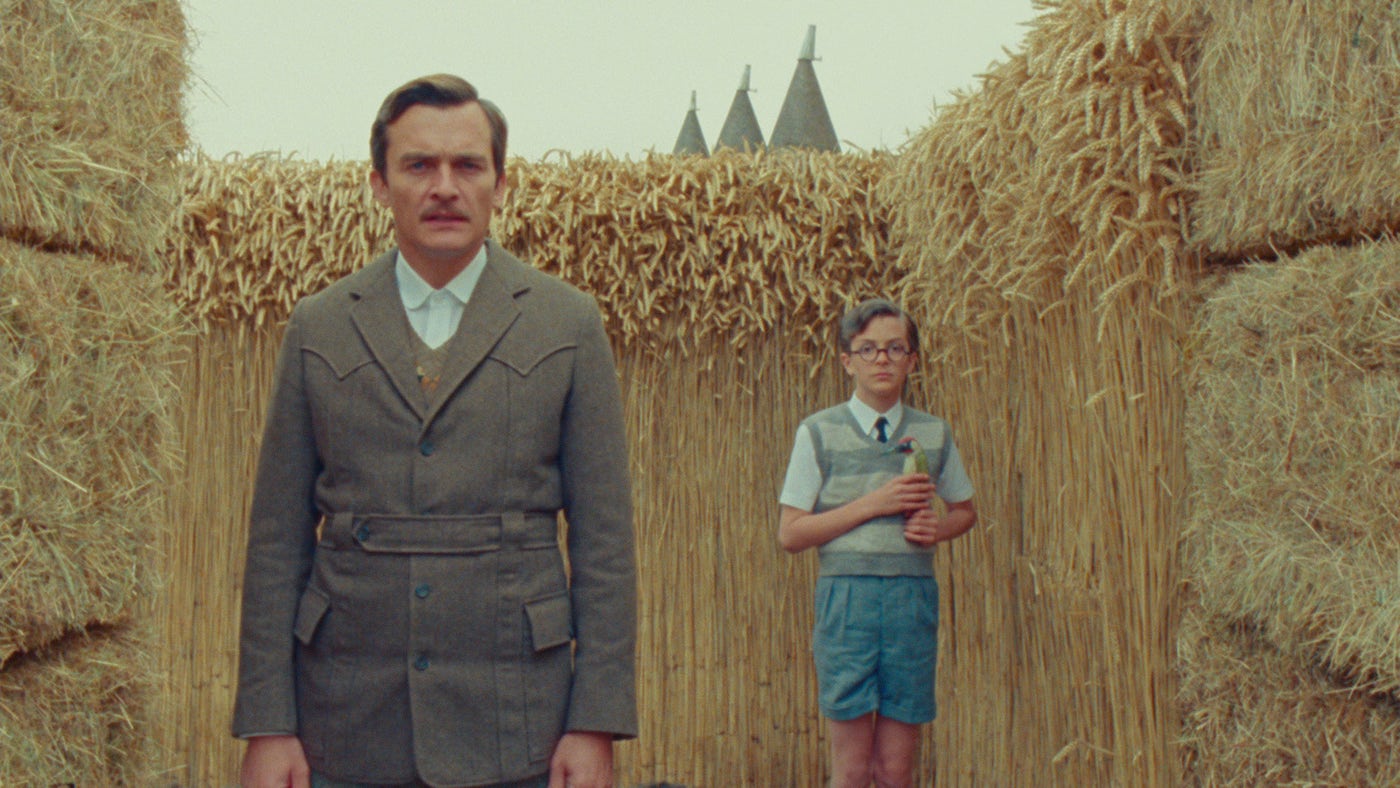

Set in the English countryside, Peter Watson (Asa Jennings) is a timid young boy who loves nature. But while innocently observing birds through a pair of binoculars, violent bullies Raymond and Ernie interrupt his quiet afternoon by brandishing a gun they’ve just been gifted. After mercilessly hounding the young boy, Peter’s forced to lay down on the railway tracks at gunpoint and only survives this frightening ordeal by sinking into the trackbed as the train passes. Despite his fervent protests, the two bullies take the young boy to a pond where Ernie kills a beautiful swan. The bully responds to Peter’s distress by promising it will fly again; making good on this promise by cutting the bird’s wings off and tying them to Peter’s arms, before forcing him to climb a tree…
Anderson’s striking visuals never undermine the sense of melancholy bleeding through between his playful whimsy and jaunty mischievousness. Audiences unfamiliar with the author’s work beyond the his most popular children’s books like Charlie and the Chocolate Factory and Matilda may be surprised to realise Dahl was capable of such crepuscular storytelling. While The Wonderful Story of Henry Sugar is charmingly optimistic, the other three adaptations go beneath the surface of society to reveal disturbing truths.
The Swan in particular is a gruelling experience that poignantly explores the lingering trauma caused through bullying. The undercurrent of pathos that sweeps the narrative derives from the participation of adult Peter (Rupert Friend) re-enacting his traumatic ordeal. While recounting the tense conditions he survived as a child, he displays no emotions and remains oblique. It’s a testament to Anderson as a filmmaker and Dahl as a storyteller that beneath the intricately designed tableaux is an immense sense of tragedy that resonates.
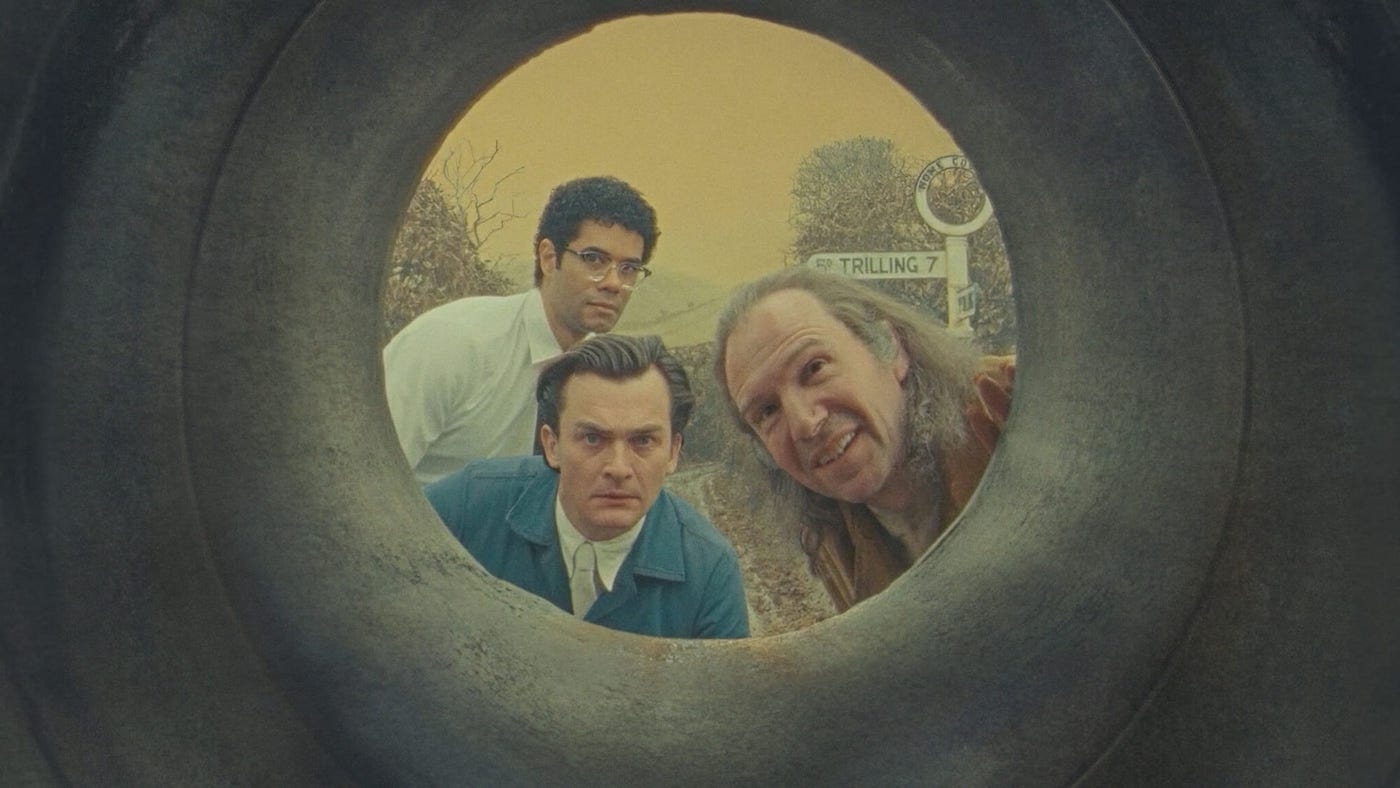

Taking place in a quaint English village, Claude (Rupert Friend) and his employee (Richard Ayoade) are tired of rats ruining their lives, so they decide to employ the ‘Rat Catcher’ (Ralph Fiennes) to resolve their problem; a peculiar man who resembles the prey he hunts. He begins to explain the difficultly of outsmarting rats and the different approaches to kill them. Unsettled, Claud informs him that the rats he needs to kill are living in a haystack in the centre of the village. The Rat Catcher formulates a cunning plan and decides to leave piles of oats for them to eat.. so after they’ve become accustomed to the snack, he’ll poison the oats…
There’s an element of horror permeating The Rat Catcher that’s beautifully nourished with Anderson’s trademark symmetrical compositions and storybook aesthetic. It’s bound by a 4:3 aspect ratio and the picturesque village is awash with an autumnal colour palette of oranges, yellows, and browns. However, it balances on the precipice of becoming a horror when the filmmaker examines Dahl’s text.
Ralph Fiennes (The Menu) gives a deliciously sinister performance as the professional rodent killer. It’s perhaps his best turn since The Grand Budapest Hotel, as the actor brings the character to life with a deliciously twisted charm while exuding a quiet menace. Even his grotesque physical appearance resembles a rate. Whenever Fiennes is on screen, Anderson projects his own disagreements about the world he lives in. If the filmmaker was offering commentary on his own country’s obsession with greed in The Wonderful Story of Henry Sugar, The Rat Catcher allows him to imaginatively empathise with rodents and objects against animal cruelty.
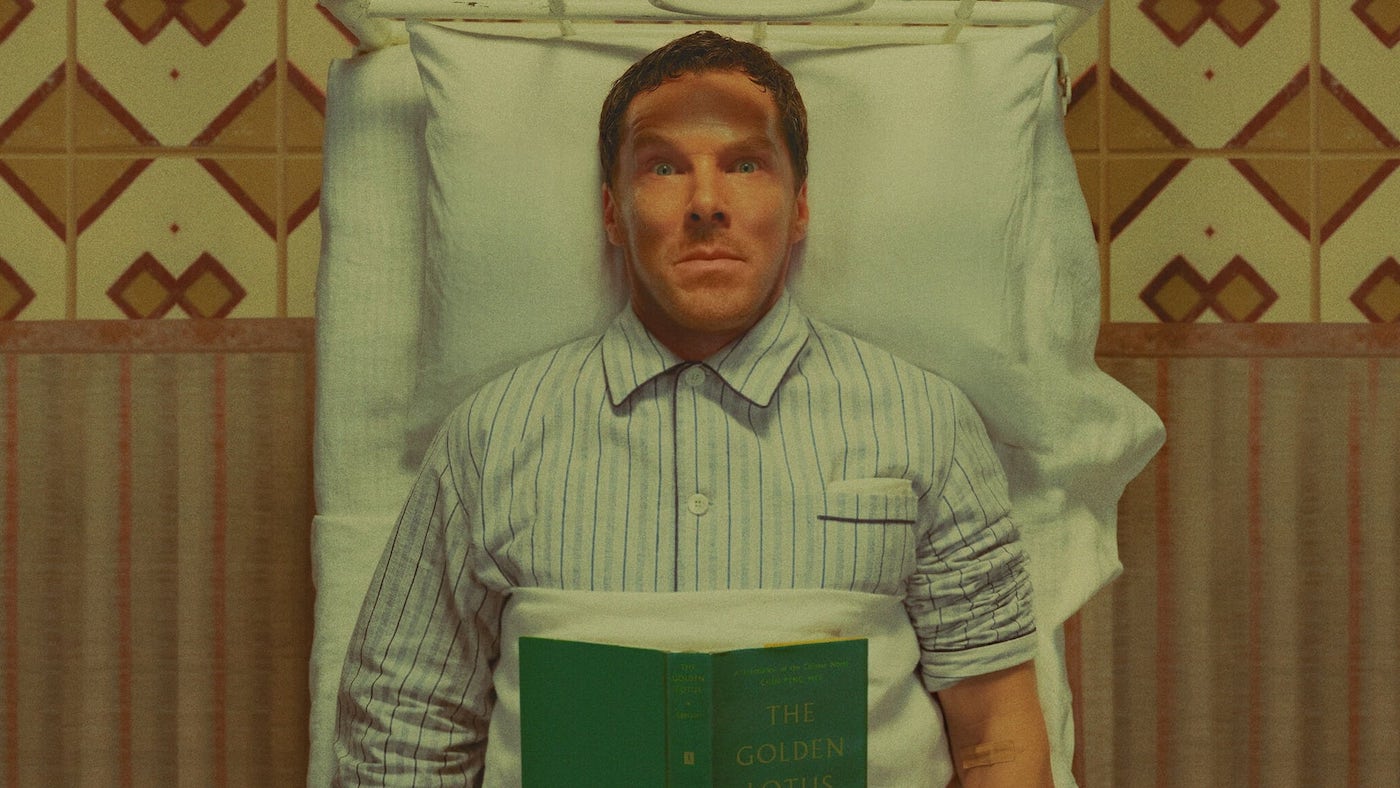

While lying on a bed reading a book, Harry (Benedict Cumberbatch) notices a deadly snake slithering on top of his pyjamas. And when Timber (Dev Patel) returns home around midnight, he notices his friend is petrified with fright. Harry remains motionless and sweating, explaining through whispers that a venomous snake’s crawled onto his stomach underneath the covers. Convinced the snake is asleep, he instructs Timber to urgently contact Dr Ganderbai (Ben Kingsley), and the Indian physician promptly arrives at the house and begins formulating the blueprint of a rescue mission…
Anderson closes the quartet with perhaps the weakest adaptation, Poison. Stripping the narrative down to its essence, he does create a riveting tension until it spectacularly breaks. The subtle ticketing of the clock and Yeoman’s contained compositions emphasis the growing urgency of the narrative until the increasing uncertainty becomes palpable. Dev Patel (The Green Knight) is incredibly charming and truly exceptional as Timber. His rapid delivery of dialogue and dramatic body language allows the actor to balance transitioning between narrator and character seamlessly. Presenting a diverging style that differentiates the perspectives, his convoluted phrases match the growing tension. Although this adaptation lacks the emotional poignancy of The Swan, it’s underlined with a cruelty that’ll make audiences grateful for the chance to breathe once the credits roll.
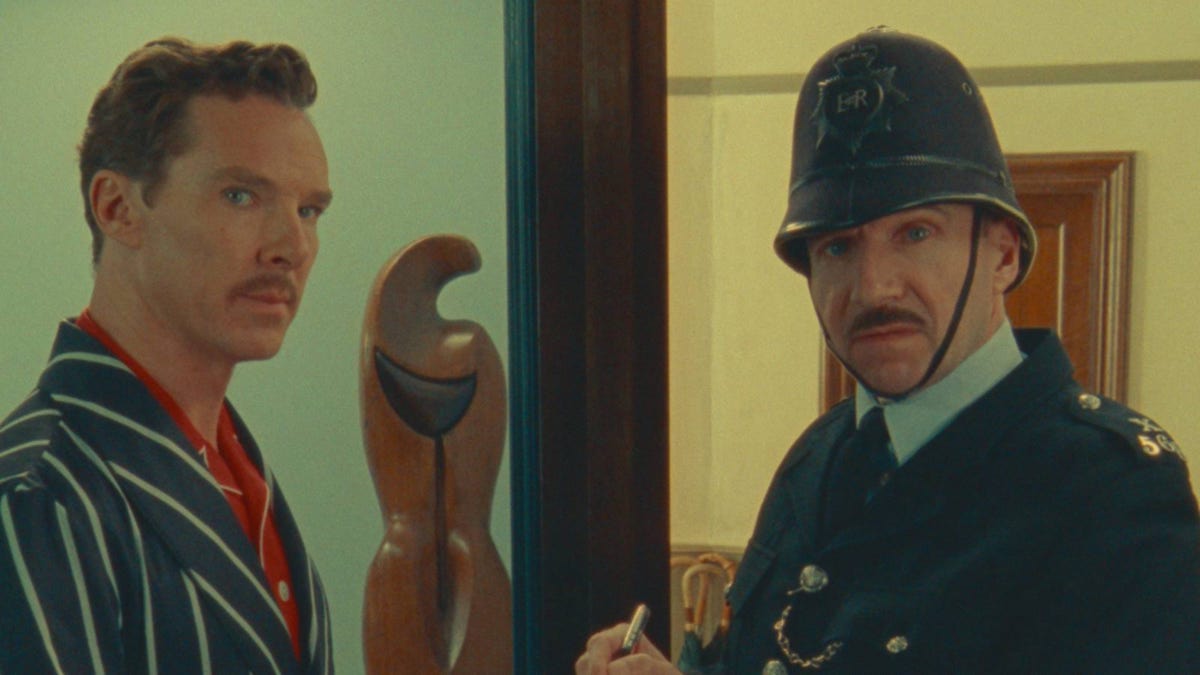
Although audiences have become somewhat accustomed to Anderson’s aesthetic, Adam Stockhausen’s (Asteroid City) production design reaches levels of theatricality that could surprise even his most ardent fans. Audiences are submerged into the filmmaker’s world of magical realism as the intricate sets open up like a blooming flower. Everything’s been so thoroughly stylised that it creates a visage that we’re viewing a Broadway theatre production. The walls are all predominantly moving stage pieces with visible mechanisms and stagehands scurrying around the edges of the frame. Throughout The Wonderful Story of Henry Sugar elaborate backgrounds are raised to reveal new locations, as times change with the swift movement of a fake wall. It’s appropriate for Dahl’s’ wondrous storytelling style and heightens Anderson’s audacious inventiveness of his wondrous artifices.
The elegance of these four adaptations lies in how Anderson uses the narrator to preserve Dahl’s voice while honouring the concept of storytelling. He’s explained, “I am equally interested in the way Dahl tells the story as I am in the story itself.” The filmmaker honours the author by having the characters recite generous amounts of the author’s texts like stage directions; essentially narrating their own story amongst dazzlingly elaborate stagecraft and costumes. They frequently follow their lines of dialogue with “he said” before turning their heads with theatrical precision to address each other. A particular moment when Ayoade explains his character’s “whole face was rigid with disbelief,” he demonstrates what the expressions may look like. This framing device maintains Dahl’s peculiar authorial voice while mitigating the potential monotony that could arise from the extensive narration. As each unique personality shares their experience to the audience, it enhances the viewer’s connection to the character.
Only the most harden Wes Anderson sceptics could fail to be charmed by his latest works. These four adaptations encapsulate many things that make the filmmaker’s storybook aesthetic so recognisable. His employs his distinct sensibilities to explore the authorship and meaning behind Roald Dahl’s work. It’s a richly textured approach that enhances the interplay between Anderson’s literary inspirations and his visual influences. His devotees will find this unpretentious slice of satisfying confectionary difficult to resist.
UK • USA | 2023 | 1.33:1 | COLOUR | ENGLISH

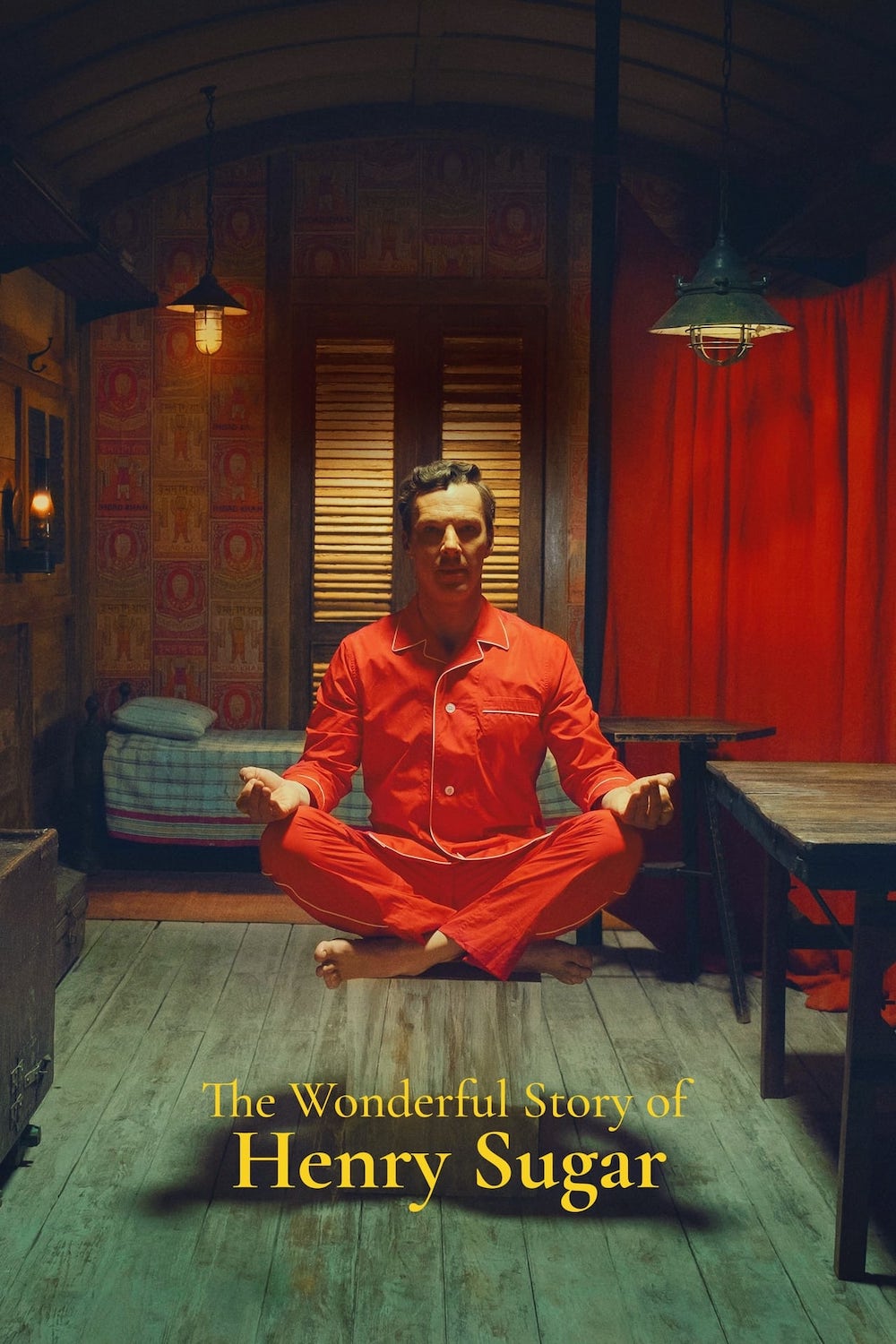
director: Wes Anderson.
writer: Wes Anderson (based on short stories by Roald Dahl).
starring: Benedict Cumberbatch, Ralph Fiennes, Dev Patel, Ben Kingsley, Rupert Friend & Richard Ayoade.
